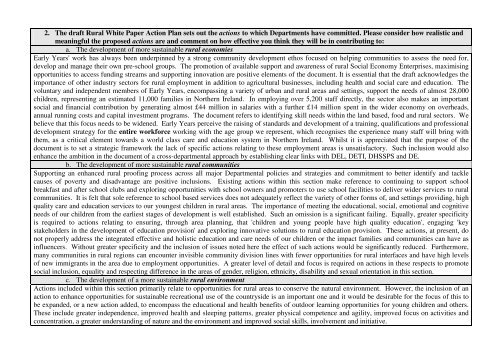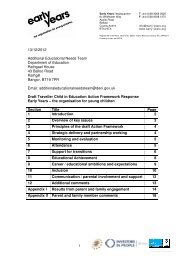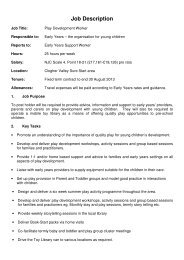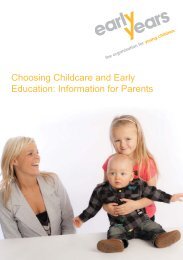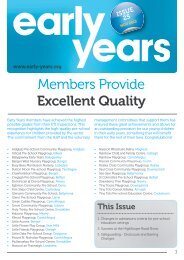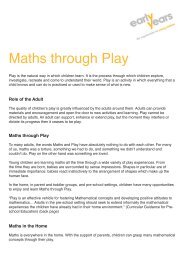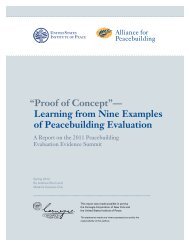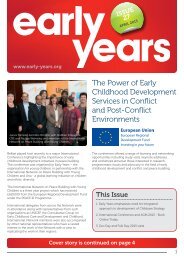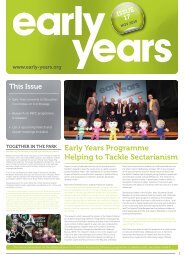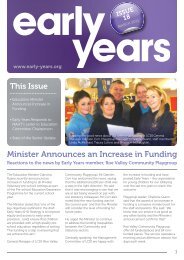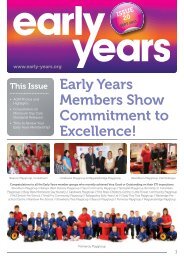Draft Rural White Paper Action Plan – Response Form - Early Years
Draft Rural White Paper Action Plan – Response Form - Early Years
Draft Rural White Paper Action Plan – Response Form - Early Years
Create successful ePaper yourself
Turn your PDF publications into a flip-book with our unique Google optimized e-Paper software.
2. The draft <strong>Rural</strong> <strong>White</strong> <strong>Paper</strong> <strong>Action</strong> <strong>Plan</strong> sets out the actions to which Departments have committed. Please consider how realistic andmeaningful the proposed actions are and comment on how effective you think they will be in contributing to:a. The development of more sustainable rural economies<strong>Early</strong> <strong>Years</strong>' work has always been underpinned by a strong community development ethos focused on helping communities to assess the need for,develop and manage their own pre-school groups. The promotion of available support and awareness of rural Social Economy Enterprises, maximisingopportunities to access funding streams and supporting innovation are positive elements of the document. It is essential that the draft acknowledges theimportance of other industry sectors for rural employment in addition to agricultural businesses, including health and social care and education. Thevoluntary and independent members of <strong>Early</strong> <strong>Years</strong>, encompassing a variety of urban and rural areas and settings, support the needs of almost 28,000children, representing an estimated 11,000 families in Northern Ireland. In employing over 5,200 staff directly, the sector also makes an importantsocial and financial contribution by generating almost £44 million in salaries with a further £14 million spent in the wider economy on overheads,annual running costs and capital investment programs. The document refers to identifying skill needs within the land based, food and rural sectors. Webelieve that this focus needs to be widened. <strong>Early</strong> <strong>Years</strong> perceive the raising of standards and development of a training, qualifications and professionaldevelopment strategy for the entire workforce working with the age group we represent, which recognises the experience many staff will bring withthem, as a critical element towards a world class care and education system in Northern Ireland. Whilst it is appreciated that the purpose of thedocument is to set a strategic framework the lack of specific actions relating to these employment areas is unsatisfactory. Such inclusion would alsoenhance the ambition in the document of a cross-departmental approach by establishing clear links with DEL, DETI, DHSSPS and DE.b. The development of more sustainable rural communitiesSupporting an enhanced rural proofing process across all major Departmental policies and strategies and commitment to better identify and tacklecauses of poverty and disadvantage are positive inclusions. Existing actions within this section make reference to continuing to support schoolbreakfast and after school clubs and exploring opportunities with school owners and promoters to use school facilities to deliver wider services to ruralcommunities. It is felt that sole reference to school based services does not adequately reflect the variety of other forms of, and settings providing, highquality care and education services to our youngest children in rural areas. The importance of meeting the educational, social, emotional and cognitiveneeds of our children from the earliest stages of development is well established. Such an omission is a significant failing. Equally, greater specificityis required to actions relating to ensuring, through area planning, that 'children and young people have high quality education', engaging 'keystakeholders in the development of education provision' and exploring innovative solutions to rural education provision. These actions, at present, donot properly address the integrated effective and holistic education and care needs of our children or the impact families and communities can have asinfluencers. Without greater specificity and the inclusion of issues noted here the effect of such actions would be significantly reduced. Furthermore,many communities in rural regions can encounter invisible community division lines with fewer opportunities for rural interfaces and have high levelsof new immigrants in the area due to employment opportunities. A greater level of detail and focus is required on actions in these respects to promotesocial inclusion, equality and respecting difference in the areas of gender, religion, ethnicity, disability and sexual orientation in this section.c. The development of a more sustainable rural environment<strong>Action</strong>s included within this section primarily relate to opportunities for rural areas to conserve the natural environment. However, the inclusion of anaction to enhance opportunities for sustainable recreational use of the countryside is an important one and it would be desirable for the focus of this tobe expanded, or a new action added, to encompass the educational and health benefits of outdoor learning opportunities for young children and others.These include greater independence, improved health and sleeping patterns, greater physical competence and agility, improved focus on activities andconcentration, a greater understanding of nature and the environment and improved social skills, involvement and initiative.


